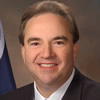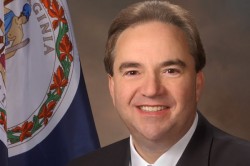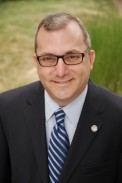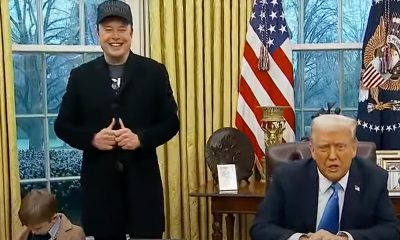Local
Christian conservatives ‘in driver’s seat’ in Va.
Dems consider lawsuit to force power-sharing as activists fear onslaught of anti-gay bills


Virginia Lt. Gov. Bill Bolling would cast the deciding vote in any tie on bills coming up for a vote, effectively giving Republicans a razor-thin majority in the Senate. (Courtesy photo)
LGBT activists said they were hopeful that the threat of a lawsuit by Democratic members of the Virginia Senate this week would persuade Republicans to share control of the chamber and decrease the chance that it will enact anti-LGBT bills following the GOP gains in last week’s election.
No one disputes the fact that Republicans have gained a one-vote legislative majority in the Virginia Senate after Republican candidates defeated two incumbent Democrats in the 40-member Senate, resulting in a 20-20 split between the two parties.
Under the Virginia Constitution, the lieutenant governor — in this case Republican Bill Bolling — has authority to cast the deciding vote in any tie on bills coming up for a vote, effectively giving Republicans a razor-thin majority in the Senate.
ALSO IN THE BLADE: HOW DID LGBT CANDIDATES FARE IN VIRGINIA ON ELECTION NIGHT?
But Democrats argue that the constitution doesn’t give Bolling authority to vote on non-legislative matters, such as who should be named as chairs of the body’s powerful committees and which party should control the committees. Both sides say the matter could wind up in court if a compromise isn’t reached before the new legislative session begins in the second week of January.
Republicans increased their existing majority in the state’s House of Delegates in the Nov. 8 election. With Republican Robert McDonnell as governor, if Republicans win the dispute over who fully controls the Senate, the conservative-leaning GOP would be in control of all branches of the Virginia government for the first time since the Civil War.
“Virginia is never a place to look for gay-friendly legislation,” said Stephen Farnsworth, professor of political communications at George Mason University and a specialist in Virginia politics. “But what you’re looking at now is a Christian conservative element of the Republican Party that is very much in the driver’s seat going forward.”
Gay Democratic leaders and LGBT activists acknowledge that even if Democrats prevail on the issue of power sharing regarding Senate committees, the Republican majority for votes on legislation means that that the Senate is now far less likely to block anti-gay bills as it did when it was under Democratic control.
“We can certainly expect that there’s going to be a cascade of really unsavory bills flooding over to the Senate from the House as there have been in recent years pertaining to issues of immigration, women’s rights and obviously gay rights, too,” said Nick Benton, editor and publisher of the Falls Church News-Press and board member of LGBT Democrats of Virginia.
“And how many of those bills can be made to die in the Senate at this point becomes a much dicier situation,” Benton said. “There’s no guarantee at all that any of that stuff is going to be beaten back.”
Nearly all news media outlets, including the Washington Post, have reported since last week’s election that Lt. Gov. Bolling’s authority to break a tie vote in the Senate would extend to votes on committee and internal Senate organizational issues as well as votes on bills.
But some Democrats this week said they dispute Republicans’ contention that the lieutenant governor has the power to vote on non-legislative issues.
“Fundamentally, the question is whether under the Virginia Constitution he has the authority to vote on Senate organizational issues as contrasted to legislative matters, substantive matters,” said Claire Gastanaga, legislative counsel and chief lobbyist for Equality Virginia, a statewide LGBT advocacy group.
“I’m not ready to predict exactly what’s going to happen with respect to the issues that we care about,” she said. “We’ll be pursuing Equality Virginia’s agenda as we always have, and once the organizational decisions are made then we’ll know who we needed to be talking to.”
Since committees and their chairs decide which bills reach the Senate floor for a vote, a determination of which party controls the committees will play a key role in deciding which bills are passed, including a bill introduced in past years calling for banning adoptions by gay and lesbian parents.
Democrats note that when there was a similar 20-20 split between the two parties in the Senate in 1996 and 1997, party leaders worked out a power sharing agreement that enabled Republicans and Democrats to chair different committees.

Newly elected Va. State Sen. Adam Ebbin said he plans to introduce a bill to bar employment discrimination against state employees based on sexual orientation and gender identity. (Photo courtesy Adam Ebbin)
House of Delegates member Adam Ebbin (D-Alexandria), the Virginia Legislature’s only openly gay member, won his race last week for a seat in the Virginia Senate, becoming the first out gay in that body.
ALSO IN THE BLADE: EBBIN’S MARCH TOWARD MAKING HISTORY
Ebbin said this week that he, too, is uncertain about the outcome of the dispute over whether Republicans will gain full control over the Senate committees or whether a power-sharing agreement will be reached. In either case, Ebbin said he plans to introduce a bill calling for banning employment discrimination against state employees based on sexual orientation and gender identity similar to the bill he introduced earlier this year.
The bill passed in the then Democratic-controlled Senate but died in committee in the GOP-controlled House.
Ebbin said he and LGBT allies in the Senate and House will do all they can to block anti-gay bills in the 2012 legislative session. But similar to Benton, Ebbin said the ability to block hostile bills will be more difficult under a GOP-controlled Senate.
“In the past, we’ve been able to count on the Senate to thwart anti-gay legislation passed by the House,” he said. “We can’t count on the Senate to do that in the next legislative session. I’m not saying that things won’t get killed in the Senate. It’s just that we can’t absolutely count on it.”
Ebbin said that in addition to a possible bill to ban gay adoptions, conservative GOP lawmakers could bring up other hostile bills that either surfaced or had been proposed in past years but died in committee. Among them were calls for banning Gay-Straight Alliance clubs in the state’s public schools and a call for banning colleges in the state from adopting non-discrimination polices related to sexual orientation and gender identity.
Ebbin said that although it would be unlikely, anti-gay groups might also attempt to persuade the legislature to repeal the only pro-gay bills it has ever passed – separate measures in 2005 and 2010 that removed an arcane state law that prohibited private insurance companies from selling health and life insurance policies to same-sex couples.
Farnsworth, the George Mason University professor, noted that virtually all Republican candidates in Virginia this year stressed economic and jobs-related issues along with their disagreements with the Obama administration over the economy. He said few if any of the GOP candidates raised social issues, such as gay rights, during their campaigns.
“It will be interesting to see just how the Republican unified government system operates in Virginia,” he said. “The lessons that Republicans have learned from the experiences in Wisconsin and Ohio and other places is that overreaching, offering up polarizing messages can be counterproductive.”
He added, “Careful Republicans with their eyes on the future may be hesitant to go too far in the conservative direction and risk a backlash.”
Are moderate Republicans the answer?
LGBT activists were hopeful that more moderate Republicans would join Sen. Tommy Norment (R-Williamsburg), the current minority leader who’s in line to become Republican majority leader. Norment was the only Republican in the Senate to vote for the state employment non-discrimination bill earlier this year when the Democratic-controlled Senate passed the measure.
Tiffany Joslyn, president of LGBT Democrats of Virginia, said she doubts that very many Republican lawmakers in the state would join Norment in backing LGBT supportive bills.
“I have no doubt they will do the same thing that they always do,” she said. “They preach moderation, they preach jobs, and then they get into office and they govern from the far right and to their far-right base.”
Joslyn called on Log Cabin Republicans of Virginia to join her group and Equality Virginia in urging more GOP lawmakers to support legislation seeking to bar LGBT discrimination in the workplace and in other areas.
Log Cabin Republicans of Virginia President David Lampo couldn’t be immediately reached this week. Christian Berle, deputy executive director of the national Log Cabin Republicans organization, said both the national and Virginia group would continue their ongoing efforts to encourage Republican lawmakers to support LGBT equality in all levels of government.
Berle also disputed predictions by gay Democrats that a GOP-controlled Virginia Legislature would result in the passage of anti-gay bills.
“They said the same thing would happen with Gov. McDonnell, that all kinds of bad things would happen,” said Berle. “It didn’t happen.”
He criticized Equality Virginia for taking the position that “only Democrats” could be counted on to support LGBT equality in the state and expressed concern that more LGBT advocates didn’t support gay Republican candidate Patrick Forrest’s race for a state Senate seat in the Northern Virginia city of Reston in this year’s election.
ALSO IN THE BLADE: IS VIRGINIA GAY REPUBLICAN SENATE CANDIDATE VICTIM OF GAY BAITING?
Gay Democrats said most LGBT activists didn’t support Forrest because he ran against incumbent Sen. Janet Howell, one of the LGBT community’s strongest allies in the Virginia Legislature.
District of Columbia
Gay Men’s Chorus of Washington to celebrate Spring Affair honorees
‘Their work inspires our music and deepens our mission’

For 44 years, the Gay Men’s Chorus of Washington (GMCW) has served as a powerful voice for love, unity, and pride among Washington’s LGBTQ community and its allies. Since its first performance in 1981—at the opening of the National Gay Task Force’s Washington office (later becoming the National LGBTQ Task Force)—GMCW has built a politically engaged and culturally significant legacy as one of the nation’s foremost LGBTQ performing arts organizations.
As its music and mission evolved, GMCW deepened its involvement in supporting LGBTQ individuals and allies alike. In 2004, the chorus launched its first Spring Affair fundraiser. This annual event not only generates financial support for the inclusive choral group, but also honors individuals and organizations in the Washington community who exemplify GMCW’s mission of unity, equity, and empowerment through music.
Each year at the Spring Affair gala, the chorus honors one community leader, one external organization, and one GMCW member. For the 2025 gala, GMCW will recognize Bishop Mariann Edgar Budde, Atlas Performing Arts Center, and GMCW member Keygan Miller.
“These honorees remind us why we sing,” said Thea Kano, artistic director of the Gay Men’s Chorus of Washington, DC, in an email. “In moments when our community has needed strength, they’ve offered hope. Whether it’s a brave voice from the pulpit, a tireless advocate for our youth, or an organization that opens its doors to every story—each has chosen to lead with love, truth, and courage. Their work inspires our music and deepens our mission.”
GMCW will honor Bishop Mariann Edgar Budde, the first woman elected to lead the Episcopal Diocese of Washington, as its 2025 individual award recipient. A longtime champion of equity and inclusion, Bishop Budde gained national prominence during the Inaugural Prayer Service at Washington National Cathedral, where she spoke directly to newly sworn-in President Donald Trump.
“Have mercy, Mr. President,” she implored, lifting the hopes of the most vulnerable Americans targeted by Trump’s policies—particularly LGBTQ and immigrant communities. Her bold words signaled to the nation that she remains a genuine and outspoken voice for justice, unity, and truth, inspiring compassion and faith within and beyond her religious community.
GMCW will present the Harmony Award for an Organization to the Atlas Performing Arts Center, located in the historic H Street, N.E. corridor. In 2024 alone, Atlas hosted more than 400 events and provided $1.6 million in free and discounted tickets, arts education, community programming, and space use. Through this work, Atlas has amplified “artistic voices that reflect the full diversity of our community.”
The center has long partnered with GMCW, offering space for open mic nights, cabarets, GenOUT Chorus events like the Youth Summit, and even memorial services such as that for Bobby T. Boaz. Atlas exemplifies GMCW’s mission of storytelling, equity, and civic connection through programs like the INTERSECTIONS Festival and City at Peace.
“We are absolutely thrilled and deeply honored that the Atlas Performing Arts Center has been named a recipient of the GMCW Harmony Award! This recognition is a powerful affirmation of our commitment to uplifting voices, fostering inclusive creative expression, and building a space where everyone feels seen, heard, and celebrated,” said Jarrod Bennett, Executive Director of the Atlas Performing Arts Center.
“At the Atlas, our mission is rooted in the belief that the arts are for everyone—and that through performance, dialogue, and community, we can help shape a more just, compassionate world. To be acknowledged by the Gay Men’s Chorus of Washington, DC—an organization that has long stood at the forefront of championing equality and advancing the well-being of the LGBTQ+ community—is a profound and humbling honor. We continue to be inspired by GMCW’s work and are proud to stand alongside them in this shared vision. Thank you, GMCW, for this beautiful recognition. We carry it forward with gratitude and renewed energy for the work ahead.”
Finally, GMCW will honor Keygan Miller, a chorus member since 2017, for their leadership, advocacy, and commitment to equity both onstage and off. Within GMCW, Miller served as Vice President of Diversity and Inclusion, led conversations to expand trans inclusion, authored the “Day One” pledge, and played a critical role in shaping inclusive programming.
Outside the chorus, Miller serves as Director of Public Training for The Trevor Project, a national nonprofit focused on crisis intervention and suicide prevention services for LGBTQ youth under 25. They previously worked as an Advocacy Manager at the Trevor Project, where they championed policies protecting LGBTQ+ youth at every level of government.
As GMCW continues its mission to uplift and unite through music, the organization encourages new voices to join its ranks. GMCW welcomes all singers—regardless of gender identity or sexual orientation—who can sing in the lower vocal registers.
The 2025 Spring Affair Gala will take place on May 17, 2025, at The Ritz-Carlton, Washington, D.C. This annual benefit supports GMCW’s artistic and educational programming. For tickets, audition information, and more, visit GMCW.org.
District of Columbia
Activists stage reenactment of 1965 gay rights protest at White House
Event marked 60th anniversary of historic picketing

With dozens of tourists watching, a little over two dozen LGBTQ activists walked in a circular picket line carrying “homosexual rights” signs on the sidewalk in front of the White House on April 17 in a reenactment of the historic 1965 first gay rights protest outside the White House.
Organized by D.C.’s Rainbow History Project, the event marked the 60th anniversary of the 1965 protest, which was organized by gay rights pioneers Frank Kameny and Lilli Vincenz on behalf of the Mattachine Society of Washington, one of D.C.’s first gay rights groups that Kameny co-founded in the early 1960s.
“The White House picket is the origin story for public demonstrations for gay rights in the U.S., and the origin story for Pride marches and the annual LGBTQ Pride celebrations which occur across the globe,” according to a leaflet prepared by Rainbow History Project that participants in the reenactment handed out to passersby and tourists.
Among those participating in the reenactment protest was longtime D.C. LGBTQ rights advocate Paul Kuntzler, who is the last known survivor of the 1965 White House gay rights protest. Kuntzler carried a replica of the sign he said he carried at the 1965 protest, which states, “Fifteen Million U.S. Homosexuals Protest Federal Treatment.”

Other signs carried by participants stated, “Homosexuals Died for Their Country, Too;” “White House Refuses Replies To Our Letters – Afraid Of Us?”; “Cuba’s Government Persecutes Homosexuals, U.S. Government Beats Them To It;” “Homosexuals are American Citizens, Too.”
The leaflet that participants distributed at the April 17 reenactment, which includes a photo of the 1965 event, lists what it says were the four main demands issued by the Mattachine Society of Washington in 1965.
They called for an end to “the exclusion of homosexuals from federal employment,” an end to the ban on gays from serving in the U.S. military, an end to the “blanket denial of security clearances for gay people,” and an end to the government’s refusal to meet with the LGBTQ community or to reply to their letters.
The leaflet includes an excerpt from a letter that Kameny wrote to then-President Lyndon B. Johnson around the time of the 1965 protest.
“We ask you, Mr. President, for what all American citizens – singly and collectively – have the right to ask,” the letter states. “That our problems be given fair, unbiased consideration…consideration in which we, ourselves, are allowed to participate actively and are invited to do so.”
The leaflet notes that although Kameny died in 2011 and Vincenz died in 2023, “their legacy is carried on by modern LGBTQ+ rights activists, who continue to advocate for employment opportunities, legal protections, inclusive health services, and more.”
Rainbow History Project official Vincent Slatt, one of the lead organizers of the reenactment protest, said his group had no trouble obtaining a permit from the National Park Service to hold the event outside the White House.
“I think the picket is going very, very well today,” he said while watching the picketers on the White House sidewalk. “We have a couple of dozen people participating. And there are lots of tourists engaging,” he said. “We’re handing out pamphlets to let them know about the historic picket and the importance of learning LGBT history.”
Slatt added, “But the highest impact is really that the media showed up to spread awareness of this.”
Lesbian activist Leticia Gomez, while walking on the White House picket line at the reenactment event, said she was among those who benefited from the 1965 protest and those that followed in support of LGBTQ rights.
“I’m blessed,” she said. “I got to work 34 years for the federal government as an out lesbian in the Department of the Navy,” she told the Blade. “So, because of what they did and all the other protests that came after that, it allowed me to have the career that I had.”
Also walking the picket line at the April 17 reenactment event was Deacon Maccubbin, owner of the former D.C. LGBTQ bookstore Lambda Rising and organizer of D.C.’s first Gay Pride Day event in 1975.
“It was really wonderful to be here today after 60 years,” he said. “I wasn’t at the first one,” he told the Blade. “But it’s just wonderful that this happened in 1965. It started the ball rolling, and all the progress that we’ve made, the fact that we do gay Pride every year in D.C. – all of those are dependent on this demonstration that got started in 1965.”
District of Columbia
Capital Pride wins $900,000 D.C. grant to support WorldPride
Funds not impacted by $1 billion budget cut looming over city

Capital Pride Alliance, the nonprofit D.C. group organizing WorldPride 2025, this week received a $900,000 grant from the city to help support the multiple events set to take place in D.C. May 17-June 8.
According to an announcement by D.C. Mayor Muriel Bowser and Events D.C., the city’s official convention, sports, and events authority, Capital Pride Alliance was one of 11 nonprofit groups organizing 2025 D.C. events to receive grants totaling $3.5 million.
The announcement says the grants are from the city’s Large Event Grant Program, which is managed by Events D.C. It says the grant program is funded by the Office of the D.C. Deputy Mayor for Planning and Economic Development through a grant from the U.S. Department of Commerce Economic Development Administration.
Nina Albert, the Deputy Mayor for Planning and Economic Development, told the Washington Blade that because the grants consist of federal funds already disbursed to the city, they are not impacted by the billion dollar budget cut imposed on the city by Congress earlier this year.
“WorldPride is one of the 11 grantees, and we’re really just excited that there’s going to be generated a large crowd and introducing the city to a national and international audience,” Albert said. “And we think it is going to be a real positive opportunity.”
The statement from the mayor’s office announcing the grants says funds from the grants can be used to support expenses associated with hosting large events such as venue rental fees, security, labor costs, equipment and other infrastructure costs.
“All of those things are things that we do for our major events, including WorldPride,” said Ryan Bos, executive director of Capital Pride Alliance. “So, the resources from this grant will be extremely helpful as we approach the final weeks of preparation of WorldPride Washington, D.C.,” he said.
Bos said Events D.C. has been an important partner in helping to promote WorldPride 2025 since the planning began more than two years ago. “And we’re excited to have them now support us financially to get us over the finish line and have an amazing event.”
Both Bos and Deputy Mayor Albert said WorldPride organizers and D.C. government officials were doing all they can to inform potential visitors from abroad and other parts of the U.S. that the local D.C. government that is hosting WorldPride is highly supportive of the LGBTQ community.
The two said WorldPride organizers and the city are pointing out to potential visitors that the local D.C. government is separate from the Trump administration and members of Congress that have put in place or advocated for policies harmful to the LGBTQ community.
“D.C. is more than the federal city,” Bos told the Blade. “It’s more than the White House, more than the Capitol,” he said. “We have a vibrant, progressive, inclusive community with many neighborhoods and a great culture.”
Marcus Allen, an official with Broccoli City, Inc., the group that organizes D.C.’s annual Broccoli City Music Festival, reached out to the Blade to point out that Broccoli City was among the 11 events, along with WorldPride, to receive a D.C. Large Event Grant of $250,000.
Allen said the Broccoli City Festival, which includes performances by musicians and performing artists of interest to African Americans and people of color, is attended by large numbers of LGBTQ people. This year’s festival will be held Aug. 8-10, with its main event taking place at Washington Nationals Stadium.
“Visitors from around the world come to D.C. to experience our world-class festivals and events,” Mayor Bowser said in the grants announcement statement. “These grants help bring that experience to life, with the music, the food, and the spirit of our neighborhoods,” she said. “Together with Events D.C., we’re creating jobs, supporting local talent, and showcasing the vibrancy of our city.”
The full list of organizations receiving this year’s Large Event grants are:
• Restaurant Association of Metropolitan Washington
• National Cherry Blossom Festival, Inc.
• Asia Heritage Foundation
• Capital Pride Alliance
• U.S. Soccer Federation
• Broccoli City, Inc.
• U.S.A. Rugby Football Union
• Washington Tennis and Education Foundation
• D.C. Jazz Festival
• Woolly Mammoth Theatre Company
• Fiesta D.C., Inc.
“Events DC is focused on creating unique experiences that result in jobs, economic impact, and lasting memories for residents, tourists, and guests,” said Events DC President and CEO Angie M. Gates in the announcement statement. “Through the Large Event Grant Program, we will support even more remarkable events this year that build community connections, celebrate our distinctive culture, and contribute to our economy.”
-

 District of Columbia4 days ago
District of Columbia4 days agoFinal push to raise funds, fill D.C. hotels as WorldPride nears
-

 District of Columbia4 days ago
District of Columbia4 days agoReenactment of 1965 gay rights protest at White House set for April 17
-

 El Salvador2 days ago
El Salvador2 days agoGay Venezuelan makeup artist remains in El Salvador mega prison
-

 Maryland4 days ago
Maryland4 days agoFreeState Justice: Transgender activist ‘hijacked’ Moore’s Transgender Day of Visibility event











